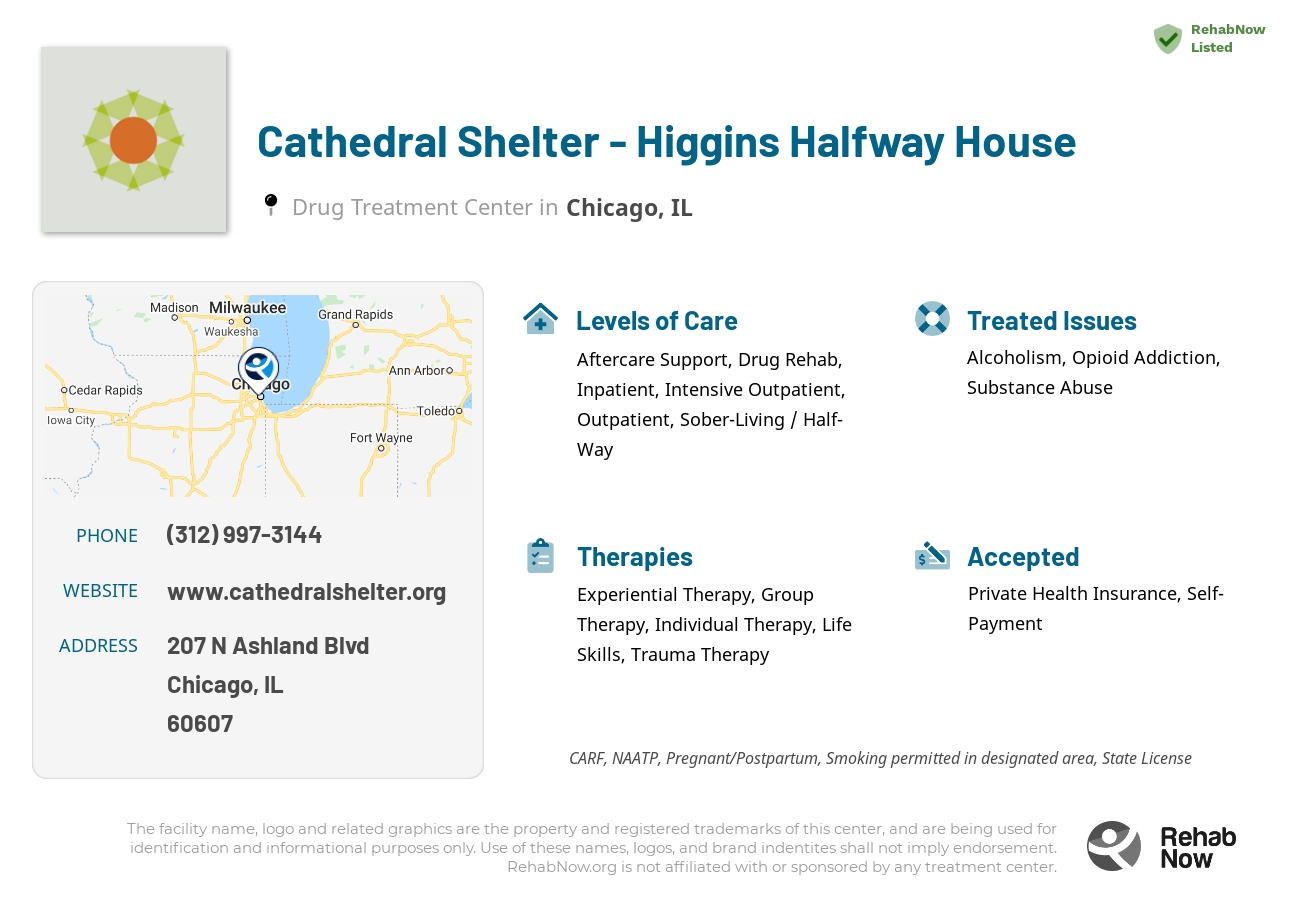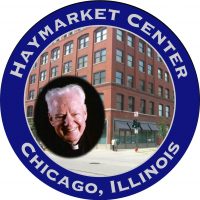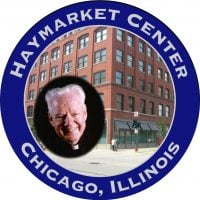
Cathedral Shelter - Higgins Halfway House
Drug Rehab Center in Chicago, Illinois
- Substance Abuse
- Opioid Addiction
- Drug Addiction
- Alcoholism
Cathedral Shelter - Higgins Halfway House is a residential treatment program in Chicago that offers evidence-based practices and personalized care to support individuals with addictions and substance abuse through a structured therapeutic environment with the goal of reducing the cycle of addiction and providing resources to those in need.
About This Chicago, IL Facility
Cathedral Shelter - Higgins Halfway House is a residential treatment program that offers an array of evidence-based practices designed to support individuals suffering from addictions and substance abuse. Located in Chicago, Illinois, the facility provides 24-hour care and a structured therapeutic environment. The primary goal at Cathedral Shelter - Higgins Halfway House is to help reduce the cycle of addiction and provide resources to those in need.
At Cathedral Shelter - Higgins Halfway House, they offer a personalized approach to addiction treatment. Clients are provided with individual counseling, group therapy, sobriety coaching, and education on addiction, relapse prevention, and crisis management. To ensure secure and personalized care, the facility is staffed by an experienced team of addiction addiction recovery professionals, including psychiatrists, nurses, and certified alcohol and drug counselors.
Cathedral Shelter - Higgins Halfway House is a nationally accredited facility and has been awarded the Joint Commission's Gold Seal of Approval for Behavioral Health Care Accreditation, and is recognized as a "top-tier" care provider by the Illinois Department of Health and Social Services. The facility also offers access to holistic services, such as nutrition counseling, yoga, and mindfulness-based therapies to aid in the recovery process.
Genders
Ages
Modality
Additional
Conditions and Issues Treated
Substance abuse is the excessive use of any type of drug. This includes alcohol, medications and illegal drugs. Substance abuse is treated with a combination of physical and mental treatments. Cathedral Shelter - Higgins Halfway House patients detox and follow up with therapies that target the underlying cause of the addiction.
Opioid addiction is one of Illinois‘s most prominent forms of addiction. Drugs, including heroin, oxycontin, and fentanyl, are the most common. To relieve pain, or ease other ailments, they are professionally prescribed, but they are often abused because they and the feelings they give are addictive.
Addiction is treated by detoxifying the body, so the medications’ chemicals are no longer impacting the individual. Cathedral Shelter - Higgins Halfway House offers therapies to correct behavior and target the root of the problem are supplemented during and throughout treatment.
Levels of Care Offered
This center offers a variety of custom treatment tailored to individual recovery. Currently available are Aftercare Support, Drug Rehab, Inpatient, Intensive Outpatient, Outpatient, Residential, Sober-Living / Half-Way, with additional therapies available as listed below.
An inpatient is a person who stays in a hospital or rehab center during treatment. For alcohol- and drug-dependent individuals, inpatient rehabs provide individualized around-the-clock services. Inpatient treatment programs address a person’s unique physical, medical, and psychological needs. A team of experts assess the severity of the addiction and design a highly tailored program. typically, the length of stay in an inpatient facility in Chicago, IL is 30 days. Those with severe addiction may need to stay at the facility for 60 to 90 days.
Intensive outpatient programs mostly conduct meetings on weekdays. Group therapy is the main element in most intensive outpatient programs. Most IOPs last for about 90 days and include drug use monitoring and testing. A Illinois IOP, like what’s offerd at Cathedral Shelter - Higgins Halfway House, take much more time than a standard outpatient program. Some programs offer other services as well, such as employment assistance and medication management.
Outpatient rehabilitation is a treatment that exists if a patient is not checking into Cathedral Shelter - Higgins Halfway House long term. In addition to helping them recover, the patient attends regular therapy sessions and detox and participates in other therapies. However, this is all primarily done from home. As a follow-up to inpatient treatment, outpatient treatment is usually recommended.
After rehabilitation, it helps people return to their everyday lives. It may also be an alternative to inpatient care in some situations. If they cannot leave their jobs, children, or don’t have the money for inpatient care, people can choose this method. Inpatient therapy, however, is the best method and most suggested level of treatment offered by Cathedral Shelter - Higgins Halfway House in recovering from addiction.
A sober living home aims to reinforce sobriety and learnings from inpatient and outpatient programs. It’s a supervised environment in Chicago, IL managed by Cathedral Shelter - Higgins Halfway House, which is guaranteed safe and free from addictive substances. There are strict rules regarding curfew and responsibilities, such as shared chores.
Residential treatment programs are those that offer housing and meals in addition to substance abuse treatment. Rehab facilities that offer residential treatment allow patients to focus solely on recovery, in an environment totally separate from their lives. Some rehab centers specialize in short-term residential treatment (a few days to a week or two), while others solely provide treatment on a long-term basis (several weeks to months). Some offer both, and tailor treatment to the patient’s individual requirements.
Cathedral Shelter - Higgins Halfway House‘s Therapies & Programs
Customized individual therapy is counseling involving you and your counselor at Cathedral Shelter - Higgins Halfway House. This builds a personal and trusting relationship so you can truly be yourself and express any emotions as you feel them. Individual therapy leads to greater peace and understanding about your triggers for addiction and coping strategies to prevent relapse.
Group Therapy is a type of counseling that occurs between a bunch of strangers. These groups are suitable for patients who are not confined in a treatment facility, but group sessions are also common in inpatient rehab programs. Group therapy is led by a trained individual at Cathedral Shelter - Higgins Halfway House in Chicago, IL and consists of members from different stages of recovery.
The goal of group therapy sessions is to foster hope and a sense of belonging, share information, and learn coping mechanisms. It also helps to have people who can relate to what you’re going through. Good behaviors can also be contagious, and participants can learn from one another.
Unresolved trauma is often a key reason why many patients resorted to substance abuse. Trauma could be physical abuse, sexual abuse, war, natural disasters, divorce, accident, loss of a loved one, etc. If trauma is the primary cause of substance abuse, then both issues must be addressed.
Patient Experience
Experiential Therapy at Cathedral Shelter - Higgins Halfway House
Experiential therapy at Cathedral Shelter - Higgins Halfway House includes helping people work through emotional disorders by participating in events in real-time. It moves away from conventional talk therapy to discuss their concerns and emotions by making patients play roles or use props. It allows people to handle trauma and feelings healthily, reducing the need to resort to alcohol and substances in Chicago, IL.
Payment Options Accepted
For specific insurance or payment methods please contact us.
Is your insurance accepted?
Ask an expert, call (888) 674-0062
Additional Details
Specifics, location, and helpful extra information.
Chicago, Illinois 60607 Phone Number(312) 997-3144 Meta DetailsUpdated November 25, 2023
Staff Verified
Patient Reviews
There are no reviews yet. Be the first one to write one.
Chicago, Illinois Addiction Information
In 2016, more than 2,350 Illinoisans died from drug overdoses. More than 5,500 deaths annually occur in Illinois due to the abuse of alcohol and other drugs. 7.17% of Illinois residents reported using illicit drugs in the past month (2018). Substance abuse costs the state approximately $3.5 billion every year.
Drug misuse can lead to other serious health problems, including HIV/AIDS or hepatitis C infection and liver disease. Chicago's main drugs of abuse include heroin, cocaine, and methamphetamine. Field sobriety tests can be used to determine if someone is driving under the influence of drugs or alcohol. There are about 872 drug treatment centers in the city, and the number of people seeking help for addiction continues to rise.
Treatment in Nearby Cities
- Highland Park, IL (21.6 mi.)
- Westmont, IL (17.1 mi.)
- Carlyle, IL (243.8 mi.)
- Golconda, IL (315.5 mi.)
- Newton, IL (201.9 mi.)
Centers near Cathedral Shelter - Higgins Halfway House



The facility name, logo and brand are the property and registered trademarks of Cathedral Shelter - Higgins Halfway House, and are being used for identification and informational purposes only. Use of these names, logos and brands shall not imply endorsement. RehabNow.org is not affiliated with or sponsored by Cathedral Shelter - Higgins Halfway House.




